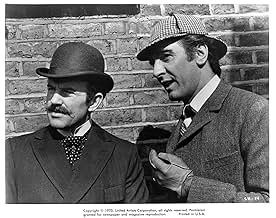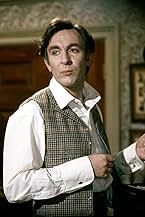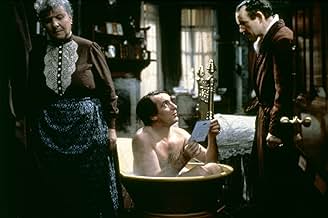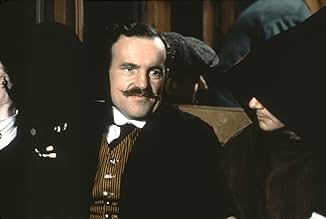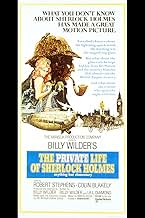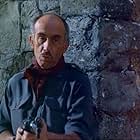When a bored Holmes eagerly takes the case of Gabrielle Valladon after an attempt on her life, the search for her missing husband leads to Loch Ness and the legendary monster.When a bored Holmes eagerly takes the case of Gabrielle Valladon after an attempt on her life, the search for her missing husband leads to Loch Ness and the legendary monster.When a bored Holmes eagerly takes the case of Gabrielle Valladon after an attempt on her life, the search for her missing husband leads to Loch Ness and the legendary monster.
- Director
- Writers
- Stars
- Awards
- 3 nominations total
Geneviève Page
- Gabrielle Valladon
- (as Genevieve Page)
- Director
- Writers
- All cast & crew
- Production, box office & more at IMDbPro
Featured reviews
What American film makers have done to Sherlock Holmes from the 1970's onwards amounts to celluloid crime. They have inflicted upon us the risible 'Seven per cent solution' and the infantile 'Sherlock Holmes' Smarter Brother' to name but two. We have also had to endure portrayals of the Baker Street sleuth by George C. Scott, Charlton Heston, Robert Downey Jnr. Will Ferrel, Roger Moore, Michael Caine and more recently Ian McKellen as a Holmes with dementia. If that weren't enough we have had the animated 'Sherlock Gnomes' and now heaven help us, Sherlock Holmes' sister!
All of the above are too hideous to contemplate and it is with great relief that I come to Billy Wilder's 'satirical homage' to Conan Doyle's great creation.
Editor Ernest Walter was assigned the unenviable task of reducing the running time by more than half. The question is, did the loss of two stories make it less of a film? Judging by the extracts of 'missing scenes' on You Tube, I think 'not' but will no doubt be shot down in flames for saying so. The inclusion of those scenes would certainly have made it far more of a parody than is the surviving footage but what remains is parody enough in my opinion.
It is the strange mixture of irreverence and homage, satire and sadness that tends to hamper my enjoyment of it.
It begins very well and the scenes involving Imperial Ballet director Rogozhin, superbly played by Clive Revill, the Prima Ballerina Madame Petrova of Tamara Toumanova and the Holmes of Robert Stephens are masterful. We are then introduced to the enigmatic and fascinating Gabrielle Valladon played by the equally enigmatic and fascinating Genevieve Page. After that the film somehow loses focus and momentum and the later scenes in Inverness are distinctly lame and rather childish.
It is only since his death that we have learned how troubled a soul was actor Robert Stephens who reportedly attempted suicide during the making of this. His demeanor suits admirably the director's concept of Holmes as not just an analytical thinking machine but as a mere mortal with the same flaws and hang ups as the rest of us. Wilder's concept of Dr. Watson as an overgrown schoolboy is not really to my taste but Colin Blakely does well enough.
Certainly not to my taste is Christopher Lee as Mycroft. He has the unique distinction of having played Mycroft and Sherlock on film and both portrayals highlight his limitations as an actor. Apparently he was a last minute replacement for the inimitable George Sanders. What a pity.
Actress Mollie Maureen, through no fault of her own, is a grotesque caricature of Queen Victoria whilst the Scottish accent of Stanley Holloway as the gravedigger needs to be heard to be abhorred.
The melancholic, bitter sweet nature of the film is underlined by the music of maestro Miklos Rozsa. He has the taken the more lyrical elements of the Violin Concerto he wrote for Jascha Heifetz in 1956 and incorporated them into one of his greatest scores. Alexandre Trauner's production design is, as always, exemplary.
As one would expect from this director, the verbal takes precedence over the visual and textually reveals Wilder's undeniable respect for and knowledge of Conan Doyle's world.
This material was close to Wilder's heart and he could not fail to be wounded by the critical mauling it received and the total disinterest of cinema goers.
One is inclined to treat it kindly because it comes from Billy Wilder but despite its merits it must alas be considered a 'near miss' as indeed were his subsequent films.
Old directors never die, it is said. They just lose their sense of direction!
All of the above are too hideous to contemplate and it is with great relief that I come to Billy Wilder's 'satirical homage' to Conan Doyle's great creation.
Editor Ernest Walter was assigned the unenviable task of reducing the running time by more than half. The question is, did the loss of two stories make it less of a film? Judging by the extracts of 'missing scenes' on You Tube, I think 'not' but will no doubt be shot down in flames for saying so. The inclusion of those scenes would certainly have made it far more of a parody than is the surviving footage but what remains is parody enough in my opinion.
It is the strange mixture of irreverence and homage, satire and sadness that tends to hamper my enjoyment of it.
It begins very well and the scenes involving Imperial Ballet director Rogozhin, superbly played by Clive Revill, the Prima Ballerina Madame Petrova of Tamara Toumanova and the Holmes of Robert Stephens are masterful. We are then introduced to the enigmatic and fascinating Gabrielle Valladon played by the equally enigmatic and fascinating Genevieve Page. After that the film somehow loses focus and momentum and the later scenes in Inverness are distinctly lame and rather childish.
It is only since his death that we have learned how troubled a soul was actor Robert Stephens who reportedly attempted suicide during the making of this. His demeanor suits admirably the director's concept of Holmes as not just an analytical thinking machine but as a mere mortal with the same flaws and hang ups as the rest of us. Wilder's concept of Dr. Watson as an overgrown schoolboy is not really to my taste but Colin Blakely does well enough.
Certainly not to my taste is Christopher Lee as Mycroft. He has the unique distinction of having played Mycroft and Sherlock on film and both portrayals highlight his limitations as an actor. Apparently he was a last minute replacement for the inimitable George Sanders. What a pity.
Actress Mollie Maureen, through no fault of her own, is a grotesque caricature of Queen Victoria whilst the Scottish accent of Stanley Holloway as the gravedigger needs to be heard to be abhorred.
The melancholic, bitter sweet nature of the film is underlined by the music of maestro Miklos Rozsa. He has the taken the more lyrical elements of the Violin Concerto he wrote for Jascha Heifetz in 1956 and incorporated them into one of his greatest scores. Alexandre Trauner's production design is, as always, exemplary.
As one would expect from this director, the verbal takes precedence over the visual and textually reveals Wilder's undeniable respect for and knowledge of Conan Doyle's world.
This material was close to Wilder's heart and he could not fail to be wounded by the critical mauling it received and the total disinterest of cinema goers.
One is inclined to treat it kindly because it comes from Billy Wilder but despite its merits it must alas be considered a 'near miss' as indeed were his subsequent films.
Old directors never die, it is said. They just lose their sense of direction!
This is fun. It wouldn't be if it had strayed too far from the Holmes persona or if it were not a good movie. Holmes is a favorite from childhood, and odd take-offs on him are generally not appreciated. I have settled on the Jeremy Brett series as the definitive version, but enjoy others that are well done. To me, with remakes and other versions, if the piece is well done, it is not only acceptable but enjoyable. With remakes, I don't know what's worse - it being a general flop as a movie or their changing it all around and calling it the same thing. Sometimes, both happen. Usually, if you like the subject matter, you will probably like a good adaptation, if a bit more inventive that the source material. The Seven Percent Solution movie was well done and enjoyable.
I haven't seen a lot of Robert Stephens, but have appreciated what I have. I looked him up and found that this was pretty light fare for his experience. This is a quality portrayal by him, and the others do a good job as well. The overall production is pleasing. The Dr. Watson portrayal mystifies a bit, that here and in other things, they make him sort of ditsy. That doesn't fit the original stories, nor what Holmes' temperament would seem to tolerate as a companion or assistant with his careful work. Maybe it came from the early Rathbone series with Nigel Bruce. Whether intentional or not, he nearly always had a bumbler quality to his portrayal.
This is a worthy production in all aspects, which I would think garnered some critical approval at its time of release. I can see why it would take the public a while to adjust to seeing Sherlock Holmes as presented here. But, it speaks of the film's overall quality that it has aged well.
I haven't seen a lot of Robert Stephens, but have appreciated what I have. I looked him up and found that this was pretty light fare for his experience. This is a quality portrayal by him, and the others do a good job as well. The overall production is pleasing. The Dr. Watson portrayal mystifies a bit, that here and in other things, they make him sort of ditsy. That doesn't fit the original stories, nor what Holmes' temperament would seem to tolerate as a companion or assistant with his careful work. Maybe it came from the early Rathbone series with Nigel Bruce. Whether intentional or not, he nearly always had a bumbler quality to his portrayal.
This is a worthy production in all aspects, which I would think garnered some critical approval at its time of release. I can see why it would take the public a while to adjust to seeing Sherlock Holmes as presented here. But, it speaks of the film's overall quality that it has aged well.
Billy Wilder's take on the world's most famous detective is both painstakingly faithful and sardonically subversive to Sir Arthur Conan Doyle's idiossyncratic creation. Presented as a case that loyal companion John Watson duly recorded but requested remain secret until long after his death, in which Holmes aids a Belgian woman find her missing husband, a mining engineer hired by an apparently non-existant English company, it makes clever use of the rulebook Conan Doyle set down while at the same time undermining it from within. The title and the plot may seem misleading at first - the first half hour especially seems at odds with what comes afterwards - but in fact if you're a Holmes fan you'll quickly realise that this is as close to romance as the detective would ever allow, and Wilder tells it through a masterful accumulation of small touches that only someone as meticulous as the man himself would notice. Script-wise, it's a cracking mystery in the best Doyle tradition, with all the time-honoured twists and turns present and correct. The acting is also up to Wilder's usual standards; Stephens and Blakely are an engaging duo as a bored Holmes and a bumbling Watson, and there's a hysterically funny supporting turn by the always underrated Revill as a Russian ballet impresario. Wilder's trademark pointed cynicism fits the English witticism particularly well, even if at times it all seems a bit too modern for the peaceful Victorian surroundings, but it is quite ironic to see him chiding Britain's stiff-upper-lip, old-fashioned morality when the film seems to be an "old timers' movie" entirely out of sync with its own time. Still, it's hard to find fault in such a thoroughly civilised and delightful entertainment.
This film is sometimes described as a comedy, and while it has humorous bits (a more sardonic and biting form of humour most of the time), it has never really felt at home being classified as a comedy, in my estimation. I do like the rapid-fire wit that Holmes seems to have here (a bit more in abundance than in the canonical Conan Doyle stories), but the Holmes presented here is a bit more dark and brooding, more akin to the extra-canonical 'Seven Percent Solution' Holmes in many ways.
Wilder was an extraordinary director and genius who sometimes gets carried away with his subject (in this regard, he is sometimes compared with Stanley Kubrick). His films are often of epic-proportions, even though they are not essentially 'epic' subjects. This film is reputed to have been nearly twice as long as the final cut version, but this may be apocryphal in that much of the raw footage never made it to final print and production. The restoration available on the disc currently available is, in fact, rather minimal - a few scenes and a few extras, but not much more than the original release of the film. This is disappointing to many fans, but in fact is more than most of us have had for a long time, as the somewhat choppy film was often mercilessly cut for television broadcast.
Holmes in this case is played by Robert Stephens, an unlikely Holmes in comparison to standards such as Rathbone, Brett, or Gillette, but still an interesting choice - quintessentially British, reserved but daring, brilliant yet flawed and faltering. Colin Blakely presents a stronger Watson than often portrayed before (this film, being made in 1970, presented this as a newer idea for Watson, one that has been picked up by many subsequent productions). Wilder has the actors play at various issues of Victorian sensibility and morality, including the implication (dismissed in the end) that Holmes might have a sexual identity issue. Christopher Lee, who himself plays Holmes in other productions, plays Holmes' smarter brother Mycroft here, to good effect.
The story line does have some inspiration from the canonical stories (the Bruce-Partington Plans, for one), and from Gillette's play (the strange case of Miss Faulkner, introducing an ending that allowed for a love interest for Holmes in the end), but for the most part takes the characters from Conan Doyle and runs far afield. Still, this is must-see film for any fan of Holmes, and any fan of Wilder, who saw this as one of his last great productions.
Wilder was an extraordinary director and genius who sometimes gets carried away with his subject (in this regard, he is sometimes compared with Stanley Kubrick). His films are often of epic-proportions, even though they are not essentially 'epic' subjects. This film is reputed to have been nearly twice as long as the final cut version, but this may be apocryphal in that much of the raw footage never made it to final print and production. The restoration available on the disc currently available is, in fact, rather minimal - a few scenes and a few extras, but not much more than the original release of the film. This is disappointing to many fans, but in fact is more than most of us have had for a long time, as the somewhat choppy film was often mercilessly cut for television broadcast.
Holmes in this case is played by Robert Stephens, an unlikely Holmes in comparison to standards such as Rathbone, Brett, or Gillette, but still an interesting choice - quintessentially British, reserved but daring, brilliant yet flawed and faltering. Colin Blakely presents a stronger Watson than often portrayed before (this film, being made in 1970, presented this as a newer idea for Watson, one that has been picked up by many subsequent productions). Wilder has the actors play at various issues of Victorian sensibility and morality, including the implication (dismissed in the end) that Holmes might have a sexual identity issue. Christopher Lee, who himself plays Holmes in other productions, plays Holmes' smarter brother Mycroft here, to good effect.
The story line does have some inspiration from the canonical stories (the Bruce-Partington Plans, for one), and from Gillette's play (the strange case of Miss Faulkner, introducing an ending that allowed for a love interest for Holmes in the end), but for the most part takes the characters from Conan Doyle and runs far afield. Still, this is must-see film for any fan of Holmes, and any fan of Wilder, who saw this as one of his last great productions.
Billy Wilder's excellent 1970 film handles the whole subject of Sherlock Holmes from a refreshingly different angle. As the title suggests, the film is rather more concerned with characterisation than plot, which although entertaining and original, is hardly an adequate stage to show off Holmes' exceptional talents.
Instead, Wilder and Diamond start with the premise that "Watson's" stories for Strand Magazine were a little more lurid than the "reality" and use it to develop a more subtle characterisation than the "thinking machine" of the literary Holmes. Admittedly, the film probably concentrates on Holmes' celebrated cocaine habit more than it should, but all references are lifted straight from the book and in any case, Stephens does not dwell on it.
Stephens himself is quite simply excellent, giving Holmes' a depth of character not seen again until Jeremy Brett on the small screen. Stephens' performance leaves us with a slightly melancholy Holmes', a man who perhaps regrets that, unlike Watson, he has dedicated his life to pure reason and while the screenplay hints at Holmes' sexuality, Stephens deflects it masterfully, remaining ambivalent and gentile where a less accomplished actor would have been simply camp, and so uses the suggestion to wrap another layer of ambiguity about the character.
All in all, Wilder and Stephens combine to make a refreshingly accessible Holmes and the entertainment comes from the interplay of characters rather than pace of plot.
Instead, Wilder and Diamond start with the premise that "Watson's" stories for Strand Magazine were a little more lurid than the "reality" and use it to develop a more subtle characterisation than the "thinking machine" of the literary Holmes. Admittedly, the film probably concentrates on Holmes' celebrated cocaine habit more than it should, but all references are lifted straight from the book and in any case, Stephens does not dwell on it.
Stephens himself is quite simply excellent, giving Holmes' a depth of character not seen again until Jeremy Brett on the small screen. Stephens' performance leaves us with a slightly melancholy Holmes', a man who perhaps regrets that, unlike Watson, he has dedicated his life to pure reason and while the screenplay hints at Holmes' sexuality, Stephens deflects it masterfully, remaining ambivalent and gentile where a less accomplished actor would have been simply camp, and so uses the suggestion to wrap another layer of ambiguity about the character.
All in all, Wilder and Stephens combine to make a refreshingly accessible Holmes and the entertainment comes from the interplay of characters rather than pace of plot.
Did you know
- TriviaBy the time of filming, Sir Christopher Lee had become famous as Count Dracula. When he and Billy Wilder walked on the shores of Loch Ness at dusk, with bats circling overhead, Wilder said to him, "You must feel quite at home here."
- GoofsThe events start in August 1887 and apparently take place in the following weeks or, at most, months. However, Mycroft Holmes tells Queen Victoria that Kaiser Wilhelm II had Count Zeppelin working on dirigibles that could drop bombs on Buckingham Palace. Wilhelm II did not become Kaiser until 15 June 1888, and Zeppelin did not start constructing rigid airships until the 1890s.
- Alternate versionsOriginally released at 125 minutes; the US laserdisc version adds 12 minutes of unreleased footage, including a sequence known as "The Dreadful Business of the Naked Honeymooners", featuring Jonathan Cecil and Nicole Shelby
- ConnectionsFeatured in The Many Faces of Sherlock Holmes (1985)
- SoundtracksConcerto for Violin and Orchestra Opus 24
by Miklós Rózsa
Details
- Release date
- Countries of origin
- Languages
- Also known as
- Das Privatleben des Sherlock Holmes
- Filming locations
- Production companies
- See more company credits at IMDbPro
Box office
- Budget
- $10,000,000 (estimated)
- Gross worldwide
- $19,930
Contribute to this page
Suggest an edit or add missing content

Top Gap
By what name was The Private Life of Sherlock Holmes (1970) officially released in India in English?
Answer

